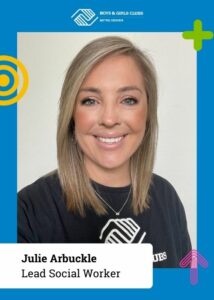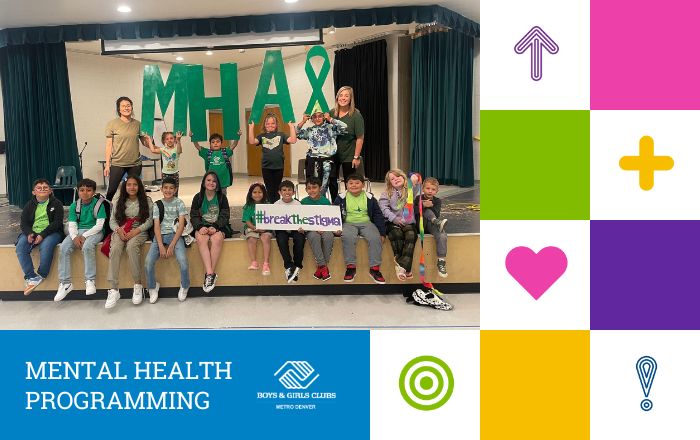
Julie Arbuckle has been working with kids at Boys & Girls Clubs of Metro Denver for three and a half years. Her service and dedication to our mission, along with the entire mental health team, is why Boys & Girls Clubs of Metro Denver won the national Boys & Girls Clubs of America Honor Award for Trauma-Informed Practice & Youth Well-being. We sat down with Julie as she shared more on our mental health program and the positive impact it has had on Club members. Learn more about our programming in the Q&A below.
Can you tell us a little bit about what you do at Boys & Girls Clubs of Metro Denver?
I am currently the Lead Social Worker on the Mental Health Team, I am also the Trauma Informed Specialist for the state of Colorado through Boys & Girls Clubs of America. This past year I worked with the kids at Emory Elementary and Cole Boys and Girls Club. My role at the Clubs is to lead Social-Emotional Learning (SEL) focused groups, support one on one’s, support staff with big behaviors from our members and to provide members with resources ranging from mental health services to basic living essentials. Another aspect of my role is to help members who are showing signs of suicide ideations. I also work closely with staff to identify specific needs and areas to better support our Club members.
Can you share more on your training with Boys & Girls Clubs of America for Mental Health Programming at the Clubs?
Over the past year and a half I have completed training through Boys & Girls Clubs of America to become a Tier 2 trainer which allows me to be a Trauma Informed Specialist as well as a Child Abuse Prevention Education Training Specialist. I was a part of the Trauma Informed Network pilot program that launched in 2021. As part of the network, I support the entire Boys & Girls Clubs Southwest region with Trauma Informed Practices trainings. I am also certified in Trust-Based Relation Intervention (TBRI), an attachment-based trauma-informed intervention.
What does Mental Health at the Clubs mean to you?
There can be a stigma around mental health, and the Mental Health team is changing that with the work we do in the Clubs. What I am proud of from my team is that we create safe spaces for our members to advocate and learn how to communicate their feelings. We work to improve their social skills, increase their self-confidence and work to reduce problem behaviors.
What are the key pillars of Mental Health at the Club?
The key pillars of Mental Health at our Clubs are to have a trauma informed approach, create an emotionally safe space for our members, and build trust to foster relationships.
What sets Boys & Girls Clubs of Metro Denver's mental health program apart?
When I first started at Boys & Girls Clubs of Metro Denver, the groundwork for the mental health team was just getting started. The amount of growth we have achieved in the past few years is incredibly exciting. Our model allows each Club to have a mental health professional present twice a week, which is not common amongst other Clubs within Boys & Girls Clubs of America. As our team is growing and being a part of the trauma informed network, we are beginning to collaborate and network with Clubs around the nation. There are great after school programs that are offered to kids, but not all those programs bring the mental health aspect to their practices. We have the amazing opportunity to offer a vast variety of programming as well as the mental health component.
The mental health team recently won the Trauma-Informed Practice Honor Award from Boys & Girls Clubs of America. Can you share more on what that means and what makes your team award winning?
The Mental Health team is an incredible aspect to our organization; we are dedicated to bringing trauma informed practices into our Clubs. We facilitate SEL groups, have partnered with CU Boulder to create an app for supporting youth with understanding their emotions and continue to support our Clubs every day. This award shows the work the Mental Health team has put forth with our programs. We are providing safe spaces for our members and having them learn with a growth mindset. We are making sure our members feel safe, heard, supported and valued.
What’s your favorite part about working in the Clubs?
My teams and the members I work with. I am very thankful to be a part of a few teams within the organization. My two Club teams mean a lot to me and make me feel valued, but my ‘’why” for doing this work is because of the kids. Creating relationships with members and knowing they have a trusted adult in me is important. I try to create a space for them to learn, feel safe and be a kid with all the extra chaos that might be going on in their life.
How do you mark success within the Mental Health Program?
One of my favorite things to do is to ask Club members what my job is at the Club. The answers vary, but when I hear that I help them with their emotions, make sure they are safe, listen to them when they are sad or mad, and let them be themselves without judgement is, I view that as a success for my role and our program.

